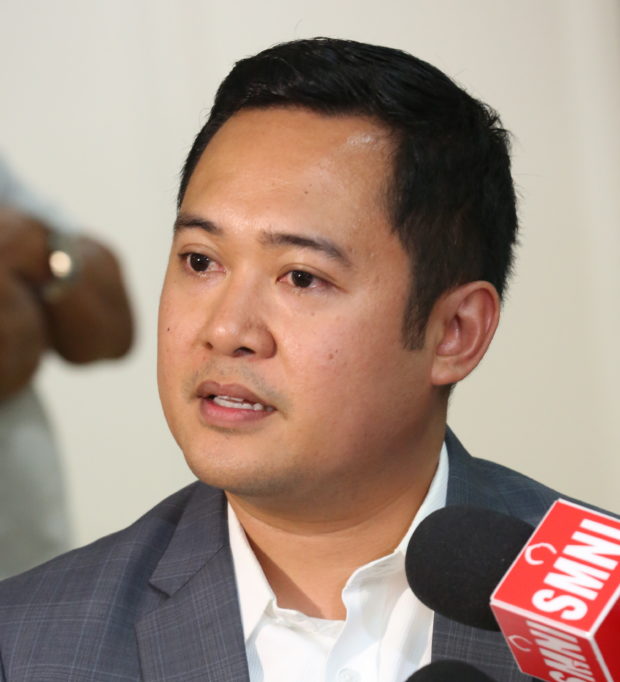
Partylist Rep. Jericho Jonas Nograles in an ambush interview in Congress.
INQUIRER FILE PHOTO
MANILA, Philippines — The Bureau of Quarantine (BOQ) did not observe a competitive selection process in choosing fintech firm PisoPay for the contract on the collection of P370 fee for the issuance of international certificate of vaccination (ICV) or “yellow cards,” a lawmaker noted on Thursday.
Puwersa ng Bayaning Atleta Rep. Jericho Jonas Nograles said during a hearing of the House Committee on Overseas Workers Affairs that the BOQ did not conform with rules in selecting PisoPay for the deal.
“I’d like to state for the record that the BOQ and PisoPay were probably just trying to do their best under the circumstances. However, along the way, I see your intent is good but maraming mga hindi nagconform sa mga dapat maconform [you did not conform to a lot of rules],” he said.
“The most striking for me is the competitive selection process. It’s apparent to me that the competitive selection process as provided for by the law was not followed here. So you guys are really courting legal problems here,” he added.
The committee was holding an inquiry into the contract of the BOQ with PisoPay over the collection of P370 fee for the issuance of ICVs. In filing House Resolution No. 2198, the 32 lawmakers said that the issuance, amendment or replacement of vaccine cards should be free of charge under the law.
However, the BOQ partnered with PisoPay to collect P370 for the issuance of yellow cards. Those who want to get the cards will have to pay P370, including P300 for documentary fee and P70 for convenience fee.
According to BOQ deputy director Roberto Salvador, PisoPay did not go through the normal bidding process for the contract due to certain exemptions.
“The engagement with Pisopay is not covered by the Republic Act No. 9184 or the Procurement Law and it did not go through the bidding process or other mode of procurement under the law. GPPB [Government Procurement Policy Board] provides that if an acquisition does not involve expenditure of funds in relation to an identified appropriation, RA 9184 and its revised IRR does not apply. The engagement with PisoPay is without cost to the government,” he explained.
But while the engagement had no cost to the government, the action of the BOQ imposed costs on Filipinos who wanted to get the ICVs, said AAMBIS-OWA partylist Rep. Sharon Garin.
Nograles also noted that while the engagement with PisoPay is excluded from the procurement law, it falls under a public-private partnership (PPP) that requires certain procedures.
“While they are exempted from [Republic Act] 9184 kasi (because there is) no cost to the government, if falls under PPP. ‘Yung sa PPP, sinunod niyo ba ang [For the PPP, did you follow] public consultation? I doubt it. Are you aware of the PPP governing board resolution which should be your checklist for awarding PisoPay exclusivity?” he said.
“If it’s not RA 9184, then it’s PPP. There is still a competitive selection process and you (BOQ) just told us that you did direct contracting without any competitive selection and subjecting without choice the people of the Republic of the Philippines, the poor people who want to work abroad, with a P70 [convenience fee]? That’s undo advantage,” he added.
Nograles then warned that PisoPay could be blacklisted in dealing with government contracts considering the issue with the yellow cards.
“The bottomline is dahil nagbigay ng unsolicited proposal ang PisoPay, tinanggap na kaagad ng BOQ, and exclusive na ‘yung PisoPay. Mayroong masamang nangyari dito,” the lawmaker said.
(The bottomline is that PisoPay gave an unsolicited proposal. The BOQ accepted it and the contract was exclusive to PisoPay. Something bad happened here.)
“In fact naaawa ako sa PisoPay, kasi sa ginawa nilang ganito, hindi ko alam kung ano pa ‘yung government contracts nila, ay pwede talaga silang mablacklist with what they are doing, and when we say blacklist they can never contract for the government again at least for five years,” he added.
(In fact, I pity PisoPay because they could be blacklisted in securing government contracts because of what they are doing. And when we say blacklisted, they can never contract for the government again at least for five years.)